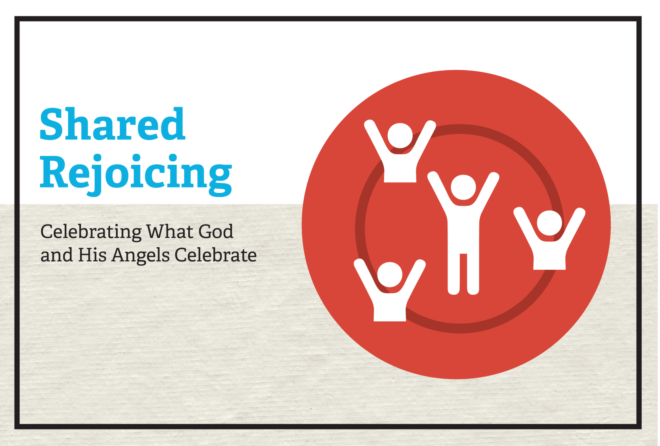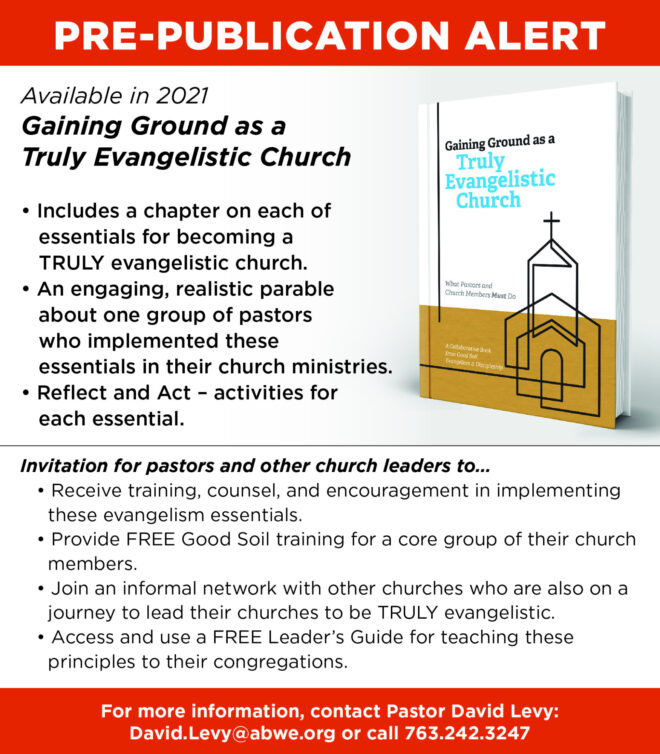Shared Rejoicing: Celebrating What God and His Angels Celebrate 10th Essential for a TRULY Evangelistic Church

We celebrate those things that bring us great joy—new babies, graduations, weddings, birthdays, Super Bowl wins, and World Series Championships. That’s all good, but what do God and His angels celebrate in heaven?
Shouldn’t our churches also celebrate what heaven is celebrating? And, if so, what would that look like in your church?
Generally, Jesus told one parable to illustrate a truth He wanted people to understand. But He told three parables in Luke 15 to explain heaven’s value of the human soul and the celebration that erupts in heaven when a sinner repents. Obviously, Jesus wanted to make a point that His followers would not miss. But have we missed it? Or have we just failed to fully grasp its significance?
You probably know the stories of the lost and found sheep, the lost and found coin, and the lost and found son. They are all woven around the same themes: (1) Something Lost, (2) Something Found, (3) Someone Joyful.
But there’s another theme you may have missed—the theme of (4) Shared Rejoicing.

We will never feel the same degree of joy that our Holy God and his Holy angels experience when lost sinners repent and are adopted into the family of God. As sinful, but forgiven, earthly creatures we are still too unholy for that. But if there is little or no joy expressed in our congregations when people are saved, as church leaders we should be greatly concerned. And it is our responsibility to lead our congregations to share in the rejoicing with the new believer, his or her Christian loved ones, and those who were influential in leading him or her to the Savior.
There are two very special occasions in the gatherings of a local body of believers when heavenly rejoicing should resound in the church.

A Public Profession of Faith
According to Scripture, a verbal confession is the corollary action that follows a sinner’s faith response from the heart. And every sincere profession of faith in Jesus Christ as Lord is cause for a celebration on earth, as well as in heaven.

—John Murray, 20th Century Scottish theologian
When a man, woman, boy, or girl professes to trust Jesus as Savior and Lord, a vital part of the evangelism process is to inform the new believer of the need to tell others of his or her life-changing experience. The obvious first place for verbal confessions is among family members and friends. But it also important that confession of personal faith in Jesus be made in a local congregation of believers, as the first step in identifying with a local church.
In an earlier chapter I explained how the 60 or so members of the little country church where I was saved discipled me. That discipleship process began when they gathered around me and sincerely rejoiced with me after I professed my faith in Jesus—it was a celebration that I will never forget. It helped to bond me to those people who shared in my joy of salvation. And it began the process of congregational discipleship that was a vital part in setting me on a course to follow Jesus.
Congregations vary in how this is done, but I suggest that this be done publicly in church, as soon as possible after the person is saved. And I also suggest that the person or people who played a role in this person’s journey to faith stand with the new believer, as a sign of support and a demonstration of the fruits of personal evangelism. A public profession of faith should always be a time of celebration.
Joy is contagious! It contributes to the vitality of church life that Jesus intended for us to experience as we gather. And shared rejoicing motivates other believers to reach out to their unsaved friends.
A Baptismal Celebration
I wonder if the tone of a baptismal service is an indicator of how TRULY evangelistic a church is—how much the congregation values what God and His angels value—how in tune the church is to the very reason Jesus came from heaven, to earth. I’m just wondering. It’s definitely something to think about.
I have observed baptismal services in many churches. In some churches people begin exiting the church as soon as the baptismal service begins. What kind of message does that send to the person identifying with Christ in baptism? In other churches, baptisms seem to be more of a dreaded “chore” than a blessed “celebration.” And in some churches the casual nature of this sacred event appears to have little more meaning than what happens with dunking machines at the church’s annual picnic. I have observed them all! Perhaps you have also.
The baptism of a redeemed sinner should be the cause for a super celebration!
I am happy to say that I have attended one church that really gets it. This church, a rather large church, schedules baptismal celebrations at certain times each year. Throughout the year, announcements are made explaining the importance and meaning of baptism, as well as the date of the next baptismal celebration.
The entire service is focused on baptism—what it means and what it doesn’t mean. Candidates for baptism are asked to write their personal faith stories—how their lives have been changed by the gospel and who helped them along the way. Prior to the baptismal service, someone from the church helps to refine those stories and then they are recorded. As a candidate approaches the baptismal pool, his or her story is played for the congregation to hear. One or more key people who have been influential in the candidate’s journey to faith in Christ accompany the candidate in the pool and even assist with the baptism. When the person being immersed is brought up out of the water there is always a spontaneous applause—a genuine sense of celebration! You would have to experience it to appreciate it fully.
I suggest that your church create its own unique plan for baptismal celebrations, with this as your guiding question:
What can our church do to reflect—as much as earthly possible—the mood that occurs in heaven when a sinner repents and identifies with Jesus Christ through believer’s baptism?
In some ways, small congregations have more flexibility for baptismal celebrations. For example, you might take a hint from the prodigal son’s father: “Let us eat and celebrate!”
Final Thoughts
In Good Soil Evangelism and Discipleship training seminars we say, “Regeneration is a point-in-time event, but conversion (in one sense of the term) is a gradual process.” That is illustrated on the Good Soil Evangelism and Discipleship scale.
As is true with other unbelievers, prior to the morning I was born again, the Holy Spirit was working in my life—working to help me understand the gospel and softening my hard heart to be more receptive to the gospel. Understanding is the vertical dimension on the Good Scale and Receptivity is the horizontal dimension. God was moving me up the scale and across the scale.
Any time God uses us to “bump” an unbeliever up or across (to the right side of) the scale, that’s something to rejoice in. Or any time a non-Christian friend responds positively to our witness, we “feel” the joy, so why not discreetly share that with other Christians who can share in our joy?
We know there is rejoicing in heaven when a sinner repents and when he or she publicly confesses “Jesus is my Savior and Lord” through believer’s baptism. But surely there is also rejoicing in heaven every time a sinner’s heart takes even the smallest turn toward God. Let’s celebrate these positive responses to God and the gospel, as simple as they may seem at the time.
Here’s a look back and a look forward to the entire set of articles in this “Twelve Essentials to a TRULY Evangelistic Church” series:
- Evangelical Pastor
- E-Team
- THE Mission
- Local Focus
- Congregational Warmth
- Equipped Congregation
- Basic Discipleship
- Peer Accountability
- Evangelistic Praying
- Shared Rejoicing
- Strategic Simplicity
- Relentless Pursuit
